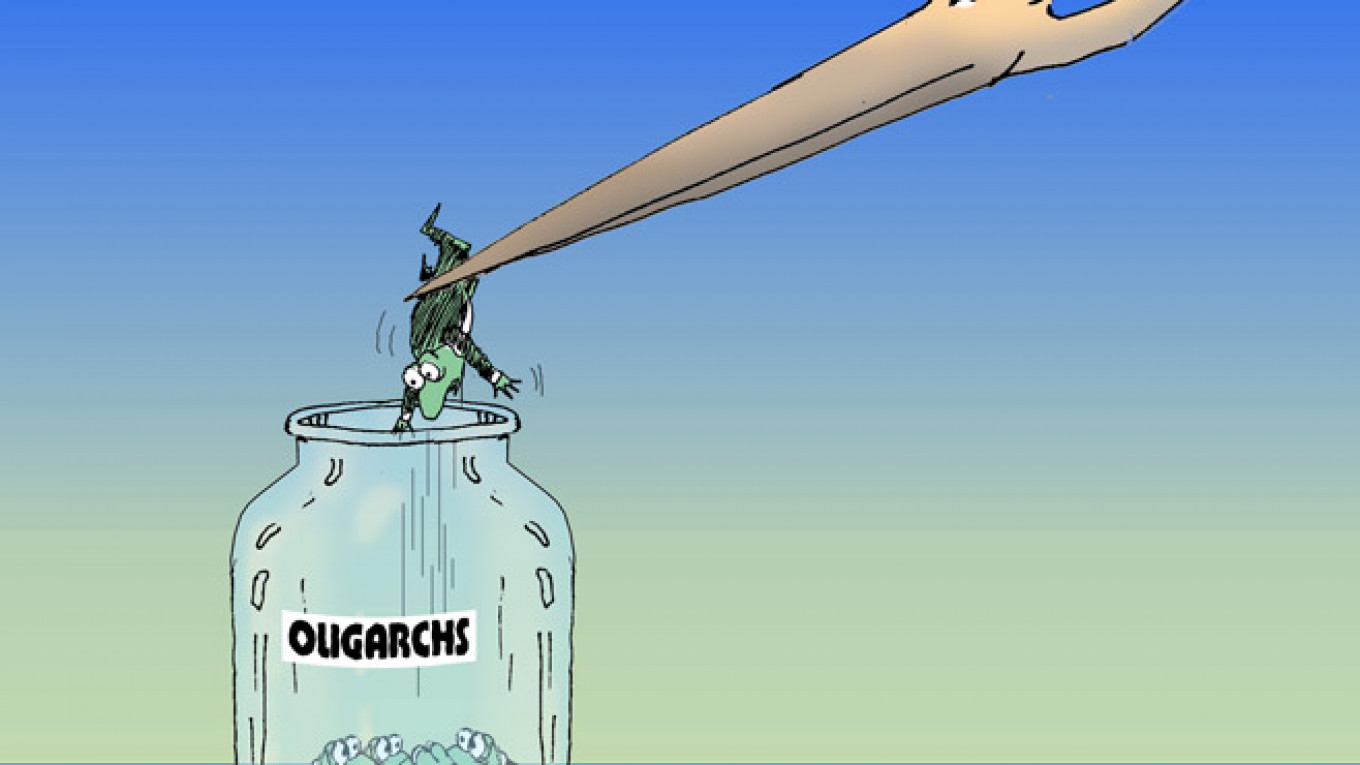The arrest on money-laundering charges of oligarch Vladimir Yevtushenkov, chairman of the Sistema holding company and, according to Forbes magazine, Russia's 15th richest man with an estimated worth of $6.8 billion as of 2010, has sent the inevitable shockwaves through the country's business elite.
Is Yevtushenkov, like Mikhail Khodorkovsky before him, the chosen sacrificial victim, the example to cow the oligarchs at a time when looming economic crisis and the pressure of sanctions is prompting them to — quiet, circumspect, but real — grumbles about the regime? To Alexander Shokhin, head of the Russian Union of Industrialists and Entrepreneurs, this "undoubtedly looks like Yukos No. 2."
Or is this a classic insider power play, as Igor Sechin, executive chair of Rosneft, moves to take control of highly successful oil company Bashneft, in which Sistema bought a controlling stake in 2009? According to persistent (albeit denied) rumors, Rosneft proposed buying Bashneft last year, part of Sechin's aggressive acquisition campaign. Instead, the plan was to list it on the London Stock Exchange this autumn, taking it out of Sechin's easy reach.
What Sistema may be unwilling to sell, Rosneft might now be able to acquire at bargain-basement prices, given that it is at the heart of the allegations leveled against Yevtushenkov and its market value has plummeted.
To some, this is a move by the siloviki, the current and former security officials, to extend their business interests. However, while Sechin (whose background strongly suggests he was in the GRU, Russian military intelligence) was once undoubtedly one of the silovik eminences, that was a long time ago. He appears to have shed that role and instead concentrates on his responsibilities as a businessman. Just as Vladimir Putin has built his current geopolitics around the notion of the (re)gathering of Russian lands, Sechin seems equally determined to turn Rosneft into a monolithic oil empire, one conquest at a time.
Then there are even suggestions that Yevtushenkov's arrest could as much as anything else be the result of bureaucratic turf wars within the security apparatus. After some time in the doldrums, the Investigative Committee seems to be trying to recover some of its waning authority, and how better than by taking a high-status scalp?
Of course, it could simply be that this is an example of law enforcement in action. Maybe Yevtushenkov really is guilty of the charges leveled against him.
But perhaps the real answer is that none of this matters — or, more precisely, that Yevtushenkov's arrest is less important in the detail of, in Lenin's pithy phrase, "kto kogo" (who beats whom?) so much as what it says about the corruption at the heart of the modern Russian system.
I have no idea whether Yevtushenkov is guilty of the charges or wholly innocent. I have never heard any suggestions that he is particularly dirty by the standards of Russian corporate life, but then again we must recognize that these are pretty questionable standards. It is hard to believe that anyone can accumulate such massive wealth in Russia without making some compromises.
The point is that Russia's political and economic system is such that it all but ensures, even requires, that its elites must also be compromised in one way or another.
Not only does this unite the elite in a shared guilt (not that many appear to feel that guilty) and a common need to preserve the system that shields them as a class, it also means that the Kremlin can always rely on being able to bring down whomever it chooses to target, for whatever reason. When everyone has a skeleton in their closet, the power lies with whomever chooses which closets to explore.
In this respect, the arrest of Yevtushenkov — one of the most apolitical oligarchs around— reflects the evolution of the Putin regime's relationship with its elite. When Putin first came to power, his priority was breaking a business elite that, under Yeltsin, had become overweening, a challenge to the authority of the state. This he did, not least with the Khodorkovsky case.
A new social contract for the Putin 2.0 era emerged, in which the oligarchs became more akin to the business managers of the Kremlin and the higher elite. So long as they did their jobs, contributed to the right causes (from Sochi to the Orthodox Church), and did nothing to challenge the status quo, they could enjoy their gilded lives.
Now things are changing. Putin is increasingly withdrawn from the business elite and seemingly suspicious of them. Perhaps with reason, given that his new neo-imperialist policies put geopolitical interests very clearly above business ones. There is no evidence that the rich are anywhere near becoming a potential threat to the Kremlin — yet. But under Putin 3.0, we can expect pre-emptive measures to ensure that any potential challenges, from oligarchs to street activists, never get to that stage.
Mark Galeotti is professor of global affairs at New York University.
A Message from The Moscow Times:
Dear readers,
We are facing unprecedented challenges. Russia's Prosecutor General's Office has designated The Moscow Times as an "undesirable" organization, criminalizing our work and putting our staff at risk of prosecution. This follows our earlier unjust labeling as a "foreign agent."
These actions are direct attempts to silence independent journalism in Russia. The authorities claim our work "discredits the decisions of the Russian leadership." We see things differently: we strive to provide accurate, unbiased reporting on Russia.
We, the journalists of The Moscow Times, refuse to be silenced. But to continue our work, we need your help.
Your support, no matter how small, makes a world of difference. If you can, please support us monthly starting from just $2. It's quick to set up, and every contribution makes a significant impact.
By supporting The Moscow Times, you're defending open, independent journalism in the face of repression. Thank you for standing with us.
Remind me later.








